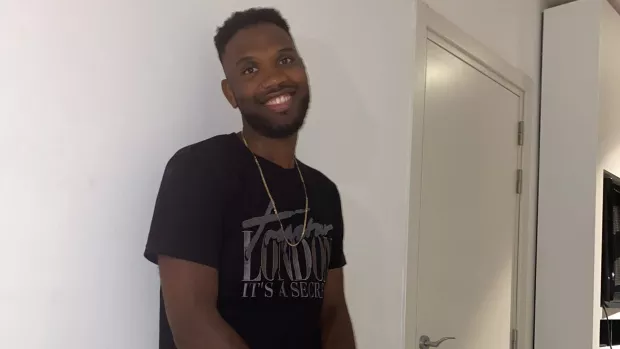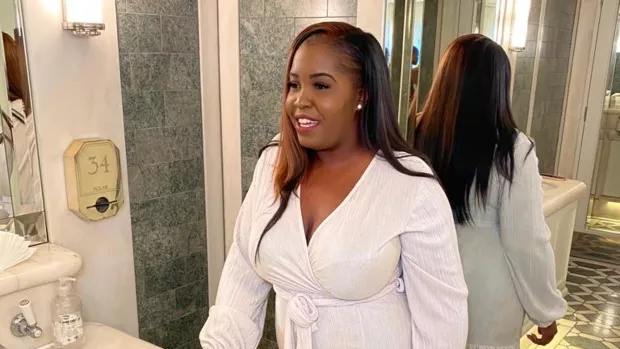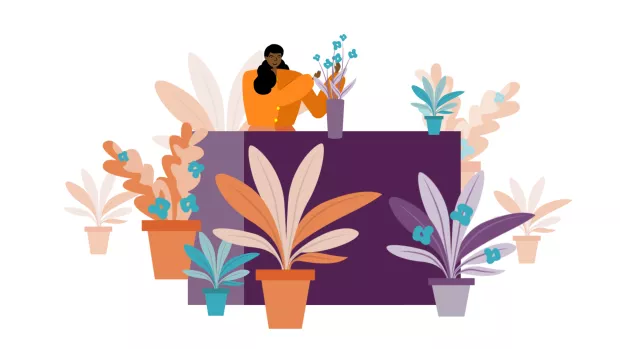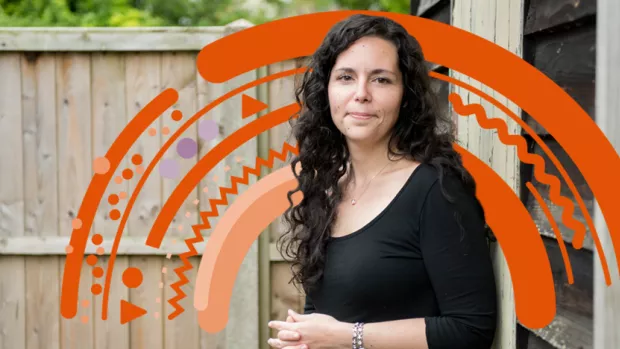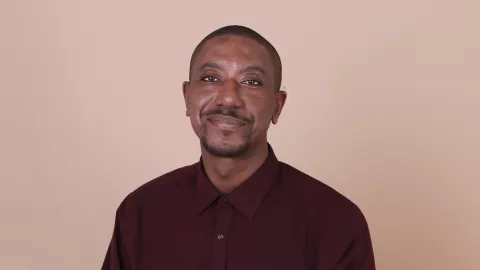
Connecting with other Black men with MS is important to me
I live in Dudley with my wife and four-year-old daughter. I’m really interested in music. Before my MS symptoms got worse, I worked as a touring sound engineer for some of the biggest names in the music industry.
My symptoms started in 2016. I was on tour in Australia, and I developed a really bad headache. I thought it was down to taking a 24-hour flight and going straight into a 2-hour show. However, the headache didn’t go away. While I was working one day, the vision in my right eye suddenly became blurred. I finally saw a doctor 2 weeks later in Japan who confirmed that I had optic neuritis.
My eventual diagnosis was a relief
From that time, I began to have severe balance and vision issues. I would be working and suddenly falling over or unable to see the sound desk properly. I felt as though I was drunk despite not having had any alcohol.
Fast forward to 2018, after numerous visits to the GP and hospital, I was finally diagnosed with multiple sclerosis.
As strange as it sounds, it was a relief being diagnosed. Up until then I could only guess what was happening to me and why I was experiencing these strange symptoms.
My mood can get really low at times
However, I had no idea at that point how MS was going to change my life. I now live with vision and hearing impairment, cognitive issues, brain fog, fatigue, insomnia, circulation and balance issues. The balance issues mean I use a walking stick at times. I’m no longer able to work as a touring sound engineer because of the rigorous schedules involved.
It's tough and my mood gets really low at times. Sometimes it’s difficult to share how I’m feeling, even with those close to me.
Feeling like the only Black man with MS
I attend a weekly MS support group, which I find really helpful. I’m around other MS warriors and we can share stories and experiences.
However one thing that is clear week on week, is that I am:
A. one of a very small number of men in the room, and
B. the only Black person in the room.
This almost mirrors how I have felt since my diagnosis. And that is the feeling that I am the only Black man living with MS.
While I know this is not the case, it’s been rare for me to meet other Black men who are on this journey. Even now I can count on one hand the amount of Black men that I know with MS.
So I’ve recently started an online support hub specifically for Black men with MS to come together and talk. I also have an Instagram page sharing my experiences in the hope of connecting with other Black men.
MS isn’t just about the physical effects
Connecting with other Black men with MS is really important to me. Everything I saw growing up and what I viewed as being a man, as displayed by my father, has been taken away by MS. To protect and provide for my family as I used to. This has had a detrimental impact on my mental health, which is something that a lot of people don’t realise about MS. It’s not just the physical effects but also the mental ones.
Things I’ve found have helped my mental health have been my family, my weekly MS support group, my church community, listening to music and listening to audio books. I also try to use my skills as a sound engineer in other areas now as I can no longer tour. I’m trying to get into sound design for TV and mixing and mastering for albums. I would also love to be able to mentor and train the next generation of sound engineers as I have so much knowledge to pass on.
Talking about mental health
I’ve only recently become more comfortable talking about my mental health. Previously it’s not something that I would have done. I was always a very private person and was someone who helped and was there for others. So having to be the person seeking support was a big change.
However, I’m now learning about the benefits of talking about how I’m feeling. I talk to my wife and others who understand my journey.
I believe traditional masculinity roles and stereotypes have caused many Black men to struggle with sharing emotions. And therefore often made us reluctant to seek help for our mental health. But I would encourage Black men to break that cycle and seek out support. Again, this is why I started the Brothers Support Hub, as I wanted to give Black men a safe space to be vulnerable and share our experiences.
You’re not alone
I’m sharing my story because I want others living with MS to know that they’re not alone. I’ve also found it therapeutic to talk about my journey. It gives me a sense of purpose.
MS has robbed me of a lot but I don’t want it to rob me of my voice.
If you are interested in joining the Brothers Support Hub for Black men living with MS, or for more information, please visit brotherssupporthub.co.uk
The first part of the blog was originally published by the MS Trust

